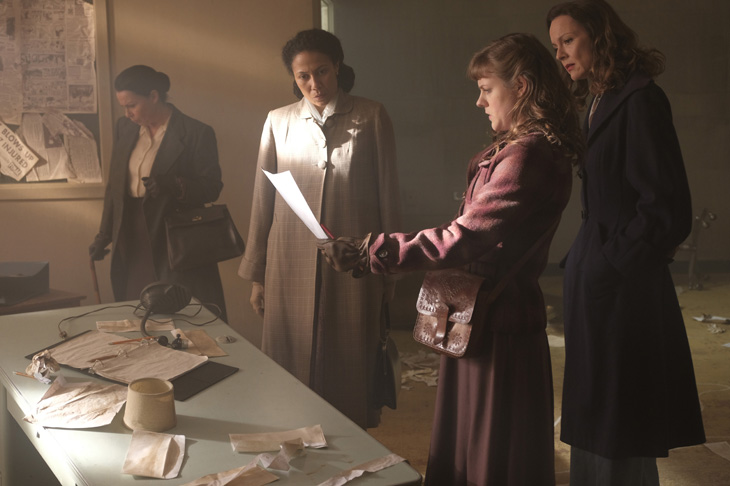After just one episode, The Bletchley Circle: San Francisco (ITV, Wednesday) seems certain to stand out from the crowd. In an age when most television dramas range from the perfectly fine to the extremely good, it already looks like a proper old-fashioned stinker.
Admittedly, one of its more obvious problems is bang up-to-date: by adhering so spinelessly to the mantra of ‘women and black people good, white men bad’, the programme not only creates an overwhelmingly dreary sense of déjà vu, it also deprives itself of any possibility of genuine dramatic tension. But there are plenty of more traditional flaws too, including such classics as wooden dialogue, leaden humour and a plot of impressively po-faced preposterousness.
The original Bletchley Circle series — cancelled a few years ago to no great public mourning — featured four women who had worked together in wartime Bletchley Park now solving crimes in 1950s London, where the baddies obligingly provided coded clues as to what they were up to. Now, rather like all those 1970s British films in which the characters in a sitcom went on holiday to Spain, it’s changed its location and… well, not much else.
The first episode began with a flashback to Bletchley Park where a group of women were cracking German codes by means of looking thoughtful while tapping pencils against their mouths. One was then murdered outside an American soldiers’ club by someone who left a strange symbol drawn on her hand. After that, we cut to 1956 when former Bletchleyite Millie (Rachael Stirling) is a bored-looking governess whose teaching methods largely consisted of getting her charges to read American newspapers. Quite why she did this was never made clear, but luckily it did allow for some cunning historical scene-setting. (‘This Elvis Presley. He’s got a song called “Heartbreak Hotel”.’) Luckier still, it also meant Millie could discover that a recent murder victim in San Francisco had been marked with the same symbol.
As a result, she consulted her old crime-fighting colleague Jean (Julie Graham), who, having been done down by the patriarchy, was at a loose end too — and who, as it turned out, had communicated during the war with a code-breaker in San Francisco known as Major Sixth. And with that, the two set off to America, wondering what kind of man the Major would prove to be.
The answer, of course, was that he’d prove to be a woman — whose real name is Iris and who, being black, is accorded the rare privilege in a TV drama of being religious without being mad. The new quartet was then completed by Iris’s friend Hailey, doubling as a gifted engineer and the Kooky One. Before long, the killer was duly providing coded clues as to what he was up to, while the women alternated between brilliant sleuthing and being patronised by a series of chortling men.
And just in case that wasn’t familiar enough, we were also introduced to a villainous property developer who wants to clear out all the black folks from the local area so that he can build luxury flats.
In the end, though, perhaps the single most irritating thing about the show is not that it covers such well-trodden ground, or even that it covers it so clumsily — but that everybody involved seems distinctly proud of themselves for treading it at all, as if pointing out that racism and sexism are bad things represents some sort of radical TV breakthrough. (Memo to programme-makers everywhere: honestly, we get it.)
Meanwhile, and maybe unexpectedly in the circumstances, the last few years have seen the emergence of a new and very different TV genre: one in which two middle-aged blokes hang out together in some lovely countryside, shooting the breeze and feeling a bit sorry for themselves.
The latest example, following The Trip and Detectorists, is BBC2’s Mortimer & Whitehouse: Gone Fishing which ended its gently entertaining run on Wednesday. The idea is that Bob Mortimer, who’s had a triple bypass, would find solace in being taught to fish by his old friend Paul Whitehouse (a mere three stents). And so it is that for six episodes, the pair have sat beside various English rivers, chatting about the indignities of middle age, with Whitehouse giving a possibly over-detailed guide to the art of fishing.
Even by the standards of the new genre, the atmosphere has tended to the melancholy. The two did say a lot of funny things, but the subject of death was never far away — which was apparently the way they liked it. (On Wednesday, they seemed almost disappointed when a doctor explained that their operations should ensure many more healthy years.) All of which rather confirms my long-held theory that male self-pity is badly underestimated as an emotion, and often far more enjoyable than it’s given credit for.






Comments